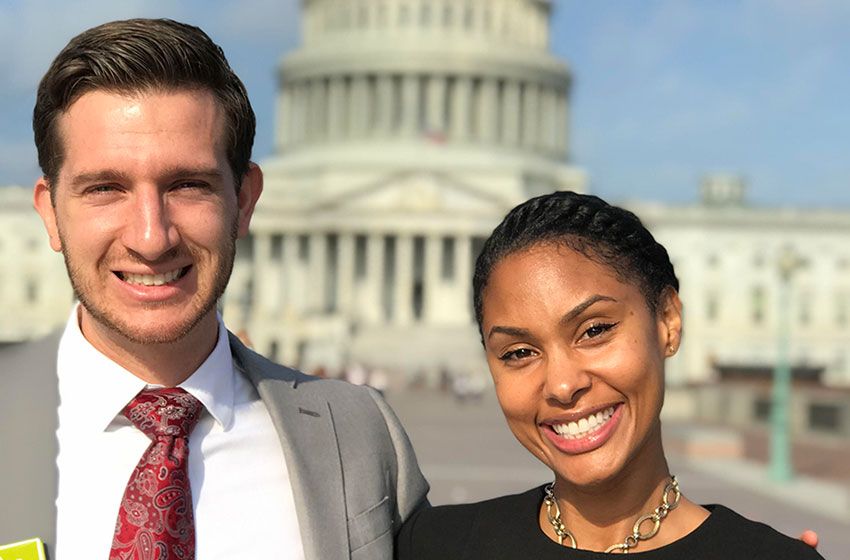
One of the most unique aspects of attending the George Washington University (GW) School of Medicine and Health Sciences (SMHS) is its home in the nation’s capital. Recently, second-year SMHS physician assistant (PA) studies students, Tatum Little and Bradley Cundiff, took advantage of GW’s location by lobbying on Capitol Hill in support of their future profession.
The opportunity was presented to them as members of the Physician Assistant Education Association’s (PAEA) Student Health Policy Fellowship, one of the organization’s signature student development offerings.
The in-person meeting consisted of a day of lectures and interactive sessions with advocacy staff from the American Academy of Physician Assistants and PAEA focusing on policy issues related to PA education and practice, advocacy, and the power of grassroots advocates. The students then got to meet with their representatives on the Hill to advocate for the profession and learn about legislation related to health care.
“Within the PA profession we’ve been more patient-focused and haven’t done much work advocating from a policy perspective,” said Little, “so what we see is PAs being left out of really important legislation.”
She said because of that, the chance to meet with lawmakers was incredible.
Little said she met with California lawmakers’ staffers, including those of Rep. Karen Bass (D), the only PA in Congress; Rep. Doris Matsui (D); and Sens. Kamala Harris (D) and Diane Feinstein (D).
“PAs fill in a lot of the health care gaps and provide more health care to underserved and more rural communities,” Little added. “But the challenge is that we don’t have as much diversity within the PA profession. So one of the objectives that is particularly important to me is increasing diversity in the PA profession.”
Cundiff met with Rep. Brett Guthrie (R-Ky.), and the staffs of Kentucky Sens. Rand Paul (R) and Mitch McConnell (R).
“This highlighted one of the most incredible parts about being at GW," he said. "Having the opportunity to be in one of the most influential cities in the world and having the Hill right outside your backdoor is something that no other PA program in the country offers."
Cundiff added that the experience showed him the need for PAs to advocate for their profession and how impactful it can be to meet with people who can help enact change.
"I expected there to be a large group of people taking care of these issues, but there's not," he noted. "This made me realize that I need to step up and encourage others to step up to get the needle moving forward on policy."
Both Little and Cundiff also spoke about the importance of meeting their peers and future colleagues from across the country. More than 15 students participated in the Hill activities.
"Being able to network and discuss issues with others who are just as passionate about the PA profession was really great. I know these are going to be people I stay connected with throughout my career," Cundiff said.
Little also spoke to the importance of the experience of being able to take what she’s learned about advocacy and put it into practice.
“This was is exciting because it was the first time they’re actually teaching us to be leaders in advocacy, so it’s about how do you organize and get the message out there to benefit the profession, which is good because that benefits the patients later down the line,” she said.


